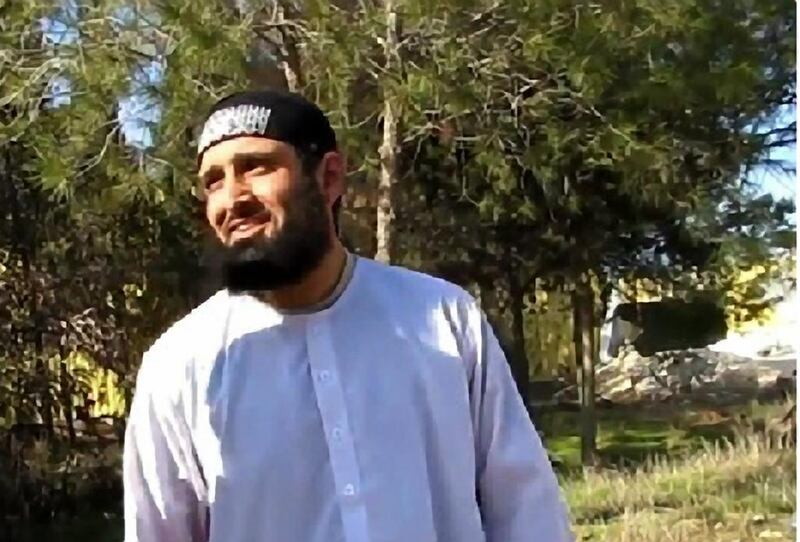LONDON // A lorry rigged with armour plates rumbles down a road in Syria as onlookers shout “God is great” above the din of gunfire.
When the lorry reaches its destination, an Aleppo prison, an explosion sends a massive cloud of black smoke into the sky.
The scene, caught on video and posted online, has focused attention on the role of western Islamic extremists in Syria's war after Abdul Waheed Majid, a Briton from the English town of Crawley, south of London, was identified as the driver.
Researchers believe that thousands of western militants have joined the rebellion aimed at unseating Syria’s president, Bashar Al Assad.
Governments in the West fear that these European, American and Australasian militants, radicalised further by their experiences in Syria, might engage in terrorist activity should they return to their home countries.
On Friday, a new video of Majid was posted online. Filmed before the attack, it shows him with what appears to be the lorry used in the prison attack. Majid appears relaxed and smiling. Dozens of people were killed in the attack and about 300 prisoners escaped.
The UK media reported that a Briton involved in aid work in Syria has launched an appeal to help Majid’s family.
The Daily Mail quoted an online message in which he said: “A personal friend of mine ... was martyred freeing the prisoners of Aleppo. What a beautiful action he did and sacrificed his wife and three children for the sake of Allah.’”
The dramatic footage of the bombing horrified Majid’s relatives, who had hoped his involvement was restricted to humanitarian work.
Yet it serves as a powerful propaganda tool for militants seeking to recruit disaffected western Muslims to the war against the Al Assad regime.
While the West backs more moderate rebel groups, it has attempted, with only partial success, to stop its citizens joining groups linked to Al Qaeda.
A video has also surfaced implicating British militants in the torture and possible execution of fellow rebels.
Sky News has shown footage of a captured FSA fighter, tied to a car tyre and beaten so severely with a metal baton that it broke in two.
It was posted to the Facebook account of a man confirmed as a British national by the International Centre for the Study of Radicalisation (ICSR) at King’s College, London.
Shiraz Maher, a senior research fellow at King’s College and the ICSR’s head of outreach, said the latest estimates, from December, put the number of foreign fighters at 3,000 to 11,000.
They are mainly from Arab countries, notably Jordan, Saudi Arabia and Lebanon.
But the western contingent has grown steadily as the conflict has intensified, with Europe supplying the majority.
“At the lower end of the range, we are talking about people we can actually provide names and details for,” Mr Maher said. “The true total of foreigners of all nationalities is probably just under 9,000.”
Of these, a maximum of 412 French citizens and 366 Britons are thought by ICSR to have joined the conflict, though other calculations suggest higher figures. One official put the number at 700 from France alone.
Belgium is the western country with most combatants as a proportion of its Muslim population, with up to 296 believed to have gone to fight in Syria.
For the United States, ICSR puts the number at between 17 and 60 and for Canada 9-100. At least 23 Australians and possibly as many as 200 have also joined the rebel cause.
“These figures include people who have gone and stayed, those who have returned and those killed,” Mr Maher said.
“Government responses have been fairly weak so far but they are now starting to think more seriously about it.
“The worry is that these people will return and be a threat to domestic security though everyone we speak to insists they have no desire to return. However, the fear remains that some may return one day, radicalised further and brutalised by their experiences, having acquired skills you don’t want them to have.”
Mr Maher, formerly a member of the radical international movement Hizb ut-Tahrir, believes there needs to be a “recalibration” of strategy by Western countries to take into account differences between the involvement of westerners in Afghanistan and Iraq, seen by militants in “West versus Islam” terms, and the attractions of the internal Syrian conflict.
Some countries appear to be heeding his advice. At the least, they are recognising the potential dangers.
This month, Canadian media reported Michel Coulombe, director of the Canadian Security Intelligence Service, told a parliamentary committee that 30 Canadians are currently fighting with extremist groups. Their return would pose a “immediate” threat, he said.
British officials have warned UK citizens they face arrest if they return. On Thursday, counter-terrorism officers searched a house in Manchester after a man from the area, named by the BBC as Anil Khalil Raoiufi, was reported killed in Syria.
“There is rising concern at the Home Office [Britain’s interior ministry] that people who go out to fight with extremist Islamist groups will not are not just going to return to run a corner shop,” said one observer of British political affairs.
foreign.desk@thenational.ae






